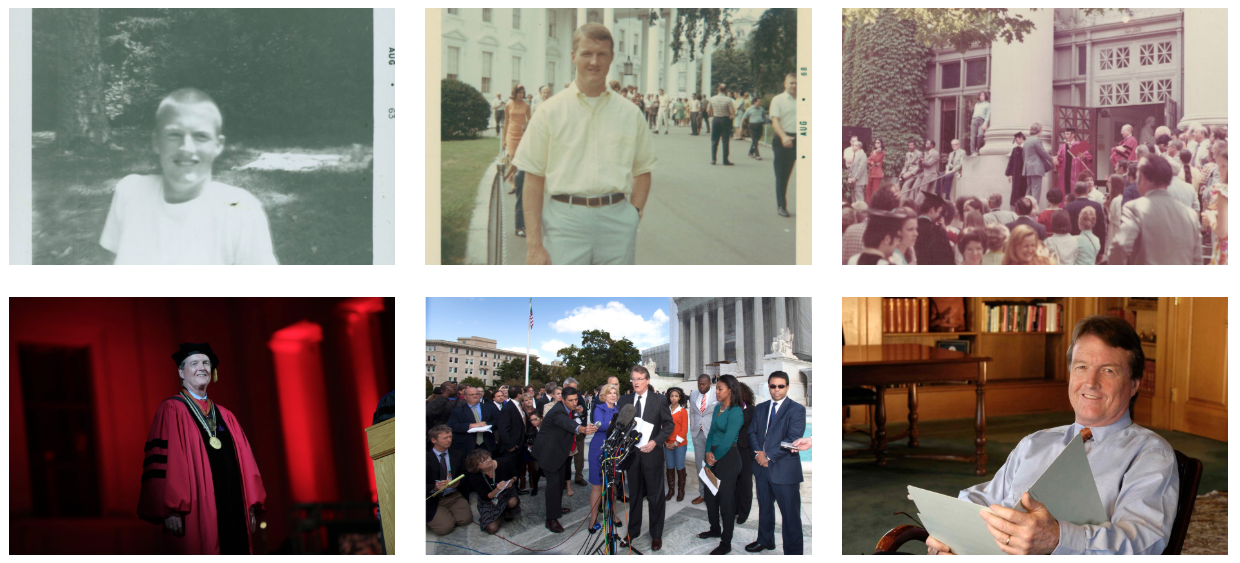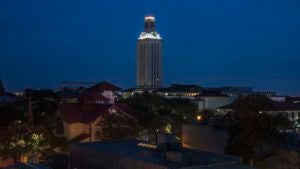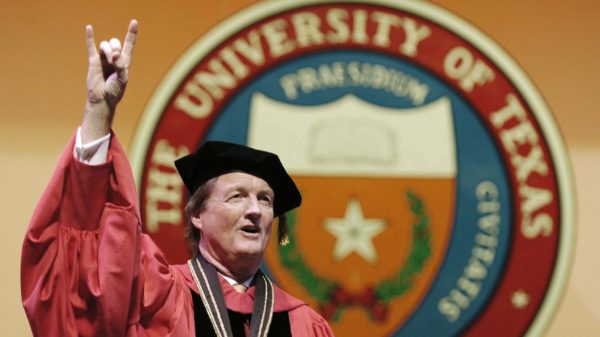Join us as we celebrate the life and legacy of former UT President Bill Powers. Friday, April 12 at 3 p.m. on the Main Mall.
Bill Powers, one of the most important figures in the history of the School of Law and of the University of Texas, passed away on Sunday, March 10. In the words of Dean Ward Farnsworth, “He was a great leader, a magnificent scholar, a beloved teacher, and a dear friend. Please join me in holding his family in your thoughts. And let me offer my condolences to the many of you who were close to Bill for years or decades. Bill was an important mentor to me, and I know that most of you had your own special relationships with him, all with their own meanings. I can only say for sure that we will all miss him.”
Information about memorial events will be shared as it becomes available.
Learn more about Powers and his tremendous life and career in the article below, reprinted with permission from the University of Texas at Austin.
William C. Powers Jr., former president of UT Austin, celebrates the University at 123, a commemoration of the university’s 123rd birthday that coincided with his installation as president in 2006.
AUSTIN, Texas — The University of Texas at Austin mourns the loss of William C. Powers Jr., its 28th president. Powers was an esteemed teacher, nationally recognized legal scholar, and staunch believer in the value of the public research university who defended UT against challenges to its mission.
Powers passed away on Sunday in Austin from complications from a fall several months earlier and from oculopharyngeal muscular dystrophy, a rare adult-onset muscle disorder.
In addition to serving as president from 2006 to 2015, he had been a member of the School of Law faculty for more than 40 years, including six as dean. He taught courses in torts and a freshman philosophy seminar, connecting with thousands of students in his career.
“Bill was an eloquent and fierce champion for UT students, faculty and staff. Never was this more evident than in the early and mid-2010s, when Bill put every ounce of himself into defending the soul of our university,” said President Gregory L. Fenves, who was recruited by Powers to return to UT as engineering dean in 2008. “For 40 years on these Forty Acres, Bill Powers embodied the UT motto, ‘What starts here changes the world.’ He lived those words. But even more importantly, he made sure legions of other Longhorns did too. We’ll miss him dearly.”
He is survived by his wife of 36 years, Kim Heilbrun of Austin, five children and their spouses and partners: Matt Powers and Jeny Wegbreit of San Francisco; Kate Powers and Scott Puryear of New York City; Allison Powers and Oscar Useche of Lubbock; Annie Powers and George Franklin of New York City; and Reid Powers and Kelsey McManus of Austin; six grandchildren; and his sister Susan Powers.
A public memorial service will be held at a later date.
Among his many accomplishments as the second-longest-serving president in UT’s history, he oversaw the establishment of two of UT’s 18 colleges and schools and the successful completion of a $3 billion capital campaign, the largest ever undertaken at a public university in Texas. He also presided over the completion or construction of 13 major buildings that changed the face of the campus.
“Bill Powers was a man of honor, a man of integrity and man who would not compromise his principles no matter the circumstance,” said Kenny Jastrow, BBA 1969, MBA 1971, who chaired the capital campaign under Powers and also chaired the Commission of 125, a group of alumni and experts that set a vision for improving a UT education. “Bill Powers was one of UT’s most outstanding presidents — and the best friend anybody could have.”
Off the Forty Acres, Powers was a member of Westminster Presbyterian Church. He loved travel, golf, crossword puzzles, wine and, most of all, time with family and friends.
During his time as law school dean, he rose to national prominence as author of the “Powers Report,” which in 2002 exposed wrongdoings at Enron and led to congressional investigations and criminal prosecutions relating to the Houston-based energy company.
Powers was born in Los Angeles in 1946 to Mildred Rose (Fluke) Powers and William Charles Powers Sr., and was raised in Southern California. He earned a bachelor’s degree in chemistry from the University of California, Berkeley, then served for three years in the U.S. Navy, stationed mostly in Bahrain. He graduated magna cum laude from Harvard University Law School, where he edited the Law Review, then clerked for a federal Ninth Circuit appeals court judge before taking his first teaching job at the University of Washington.

From left to right:Powers in 1963. In front of the White House, 1968. Graduating from Harvard Law School in 1973. At UT Austin Commencement in 2012 (photo by Emily Kinsolving). At a press conference outside the U.S. Supreme Court following oral arguments in the Fisher vs. University of Texas affirmative action case on Oct. 10, 2012 (photo by Paul Fetters). In his office at UT Austin.
Powers joined the UT law faculty in 1977 and soon became one of the nation’s foremost experts on torts. His honors included the John G. Fleming Memorial Prize, the Robert B. McKay Award from the American Bar Association, and an appointment by the prestigious American Law Institute (ALI) as Reporter for Restatement (Third) for Torts, the most important text for practitioners in that field. From 2001 to 2005 he was named by the ALI as the R. Ammi Cutter Reporter, reflecting the excellence of his work on the Restatement. He authored numerous other articles and textbooks and enjoyed a thriving practice as a consultant on a wide range of complex tort cases. Most recently, he served as Of Counsel at the Jackson Walker law firm.
His arrival at UT in 1977 — he frequently spoke about driving from Washington and spending his first night in Austin at the Villa Capri hotel just off campus — also began a four-decade relationship in which he would serve as dean and then president and which would make a lasting impact on his university, community and state.
“What a blessing for me to spend my career here at UT,” Powers said upon receiving a Distinguished Service Award from the Texas Exes in 2016. “It’s one of the world’s great teaching and research universities. We teach the next generation of leaders on a campus that helps discover planets orbiting distant stars and that helps understand dark matter and, yes, even helps us understand even better what Shakespeare is about. Every single one of us needs to work hard every day to keep it that way.”
As president, Powers established a vice presidency to oversee diversity and community engagement. He led the national higher education community’s efforts to recognize and promote the educational benefits of diversity, taking UT to the Supreme Court to defend the use of race and ethnicity as one factor in admissions — ultimately winning a favorable ruling in the Fisher case in 2016.

UT Austin President William C. Powers Jr.
On campus, Powers transformed the undergraduate curriculum and implemented many of the recommendations of the Commission of 125: He established the School of Undergraduate Studies and introduced signature courses as a requirement for undergraduates. He was instrumental in creating Dell Medical School, the first new medical school at a tier one public university in decades.
In 2011, Powers set an ambitious goal to increase UT’s four-year graduation rate from about 50 percent to nearly 70 percent (as of last year, it had risen to 69.8 percent). He strived to make the university more efficient and accountable by following what he called the “Moneyball” model, named for the best-selling book of the early 2000s.
A fixture at football, volleyball and basketball games and other Longhorns events, Powers launched the Longhorn Network in 2011. He helped the Big 12 thrive as a power conference after a difficult realignment period in the early 2010s. And he was on the national committee that established the College Football Playoffs.
Powers’ most enduring legacy as president, however, came when the university faced critics in state government who sought to redefine UT’s fundamental mission of providing a first-class education to Texas students and engaging in world-changing research.
“He bravely stood up for what was right,” Fenves said, “and he fought against a view of higher education that would have compromised UT’s constitutional charge to be a ‘university of the first class,’ while setting a dangerous precedent for public research universities across the nation.”
As a defender of the research university ecosystem, Powers drew broad support among faculty members and was widely popular with students and alumni, many of whom took extraordinary measures to back him. At the height of that controversy, the Association of American Universities, which represents the nation’s premier research institutions, named Powers as its chairman.
In accepting his own Distinguished Alumnus Award last year, UT System Board of Regents Vice Chair Steve Hicks described Powers as the general who led Longhorn Nation through “an ugly time of the university” and remained president until UT’s future was secure.
“He is my hero,” Hicks said.
Friends who wish to make a donation in memory of President Powers may contribute to the William C. Powers and Kim Heilbrun Endowed Scholarship Fund in the UT Law School Foundation

